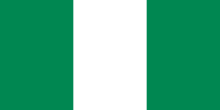Nigeria at the 1996 Summer Paralympics
| Nigeria at the 1996 Summer Paralympics |
|||||||||
|---|---|---|---|---|---|---|---|---|---|
 |
|||||||||
| IPC code | NGR | ||||||||
| NPC | Nigeria Paralympic Committee | ||||||||
| in Atlanta | |||||||||
| Competitors | 8 | ||||||||
|
Medals Ranked 35th |
|
||||||||
| Summer Paralympics appearances | |||||||||
8 male athletes from Nigeria competed at the 1996 Summer Paralympics in Atlanta, United States.
In many parts of Black Africa, people who have disabilities that include insanity, and physical disabilities such as impairments and deformities often face cultural barriers to participation because of attitudes related to their disabilities. These include beliefs that they acquired their disabilities because their parents were witches or they are wizards. Their disability is often seen as a result of a personal failing on their part. As such, there is often tremendous cultural pressure for people with physical disabilities to remain hidden and out of the public eye. In many places, they are perceived to be monsters in need of healing. This is the context to which Nigerian Paralympians engage both society and sport internally, in their own country.
The Nigerian Paralympic delegation left the Games having won more medals than their Olympic counterparts.Adeoye Ajibola would later go on to represent Nigeria in able-bodied competition.
Nigeria was represented in table tennis by Segun Toriola. These were Toriola's second Paralympic Games.
...
Wikipedia
